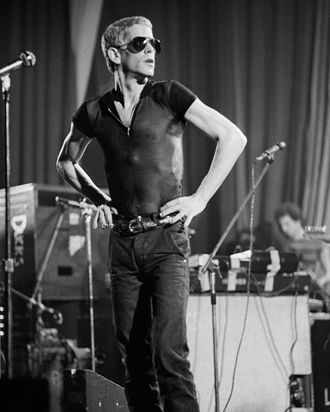
Over the years, Lou Reed, who died today at age 71, gained the reputation for being a sensationally prickly interview subject. His reticence with the press may have reflected who he really was or it may have been just another part of his act, but either way, question-and-answer sessions with Reed more than once involved him getting perturbed and then unceremoniously shutting the interviewer down.
Most of these confrontations were sparked by innocuous questions that Reed deemed irrelevant or simplistic. But in the seventies, critic Lester Bangs engaged in a series of fanged interviews with Reed that were far from polite on both sides.
In a brutal 1973 profile of Reed in the influential UK magazine Let It Rock, Bangs encountered the “Walk on the Wild Side” singer in the cocktail lounge of a Holiday Inn while on tour, describing him as a “vaguely uncomfortable fat man” whose boozehound face has taken on a “nursing-home pallor” and whose jittery hand can hardly lift his glass of Johnnie Walker Black for all the shaking.
Reed is cantankerous, hilarious, sad, misunderstood, and forthright, and Bangs is dismissive of all of it. Reed explained why he takes drugs:
“I take drugs just because in the 20th century in a technological age living in the city there are certain drugs you have to take just to keep youself normal like a caveman. Just to bring yourself up or down, but to attain equilibrium you need to take certain drugs. They don’t getcha high even. They just getcha normal.”
Reed, whose romantic partner in this era was a transvestite named Rachel, was ahead of his time in speaking frankly about homosexuality:
“You can’t listen to a record and say, ‘Oh that really turned me onto gay life, I’m gonna be gay.’ A lot of people will have one or two experiences, and that’ll be it. Things may not change one iota. It’s beyond the control of a straight person to turn gay at the age he’ll probably be listening to any of his stuff or reading about it; he’ll already be determined psychologically.’”
The story ends with Bangs goading Reed after a concert as they both get smashed, until someone finally brings Reed back to his room.
I’ll always carry that last picture of him, plopped in his chair like a sack of spuds, sucking on his eternal Scotch with his head hanging off into shadow, looking like a deaf mute in a telephone booth. (He’s still pretty cool, though; I stole that last phrase from him.)
If all this makes you feel sorry for him, then you can compliment yourself on being a real Lou Reed fan.
Because that’s exactly what he wants.
Bangs kept after Reed over the years, alternately sparring, slamming, or raving about him. In a famous review in Creem for Reed’s fifth solo album, the widely reviled atonal Metal Machine Music, the critic gave a hugely positive assessment of the experimental record.
Speaking of clearing out crap, I once had this friend who would say, “I take acid at least every two months & JUST BLOW ALL THE BAD SHIT OUTA MY BRAIN!” So I say the same thing about MMM. Except I take it about once a day, like vitamins.
As the seventies wore on, it became clear that Bangs and Reed shared a mutual respect to go with their comparably outsized egos. In “Let Us Now Praise Famous Death Dwarves, or How I Slugged It Out with Lou Reed and Stayed Awake,” an interview Bangs wrote for Creem in 1975, the two playfully spar like Apollo Creed and Rocky Balboa in Rocky III.
After a lot of back and forth, Bangs sums up his feelings about his subject thusly:
“Lou Reed is my own hero principally because he stands for all the most fucked up things that I could ever possibly conceive of. Which probably only shows the limits of my imagination.”
There have been many words written about Reed over the years (also worth noting: former New Yorker pop critic Ellen Willis’s thoughtful reviews and liner notes), but no writer proved a more even match for the late rocker.




